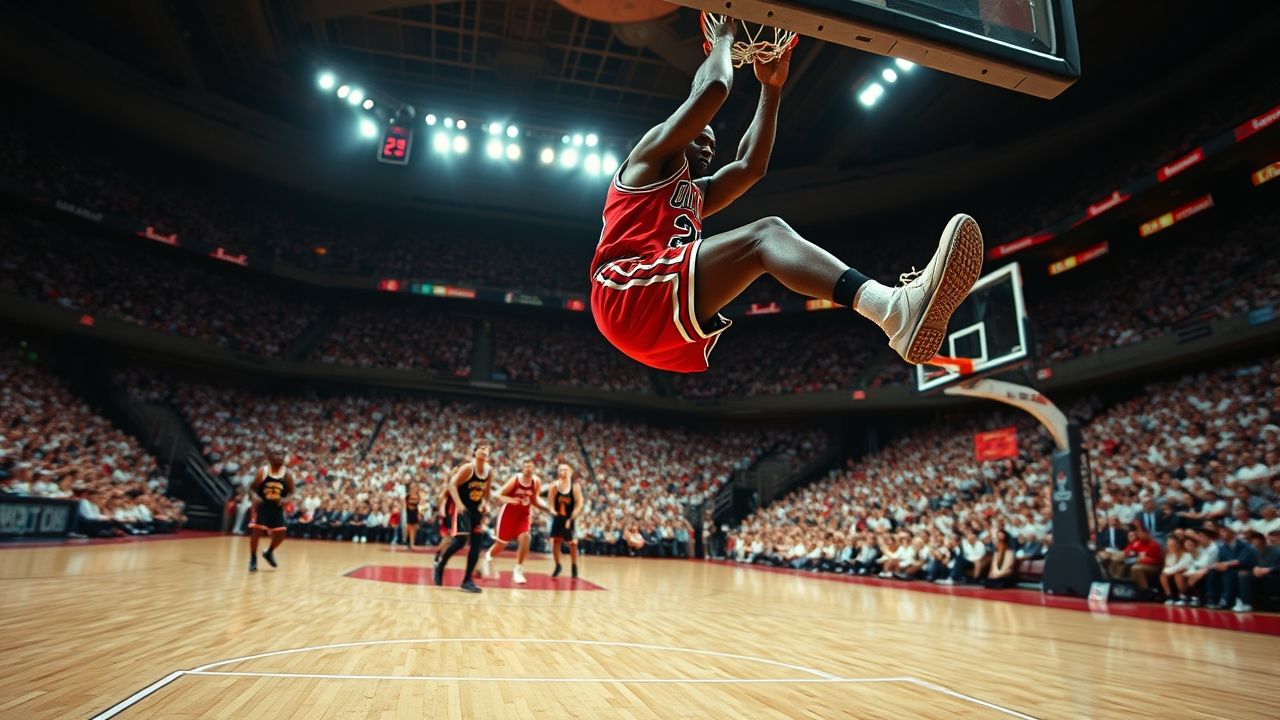Michael Jordan: Unpacking the Enduring Legacy of an NBA Icon
In the annals of sports history, few names resonate with the same power and reverence as Michael Jordan. He wasn’t just a basketball player; he was a phenomenon, a cultural icon whose influence transcended the court, reshaping not only the NBA but also the very landscape of global athletics and commerce. From his gravity-defying dunks to his unyielding competitive spirit, Jordan captivated millions, setting new standards for athletic excellence and brand endorsement. His story is one of relentless pursuit of greatness, marked by unparalleled achievements and an enduring mystique that continues to inspire generations.
Key Summary
- Unparalleled Dominance: Michael Jordan led the Chicago Bulls to six NBA championships in the 1990s, securing two distinct three-peats.
- Individual Accolades: He earned five MVP awards, ten scoring titles, and six NBA Finals MVP awards, among numerous other distinctions.
- Global Icon: Jordan’s impact extended far beyond basketball, turning him into a global brand ambassador and a symbol of athletic perfection.
- Business Acumen: The success of Brand Jordan under Nike revolutionized athlete endorsements and sportswear marketing.
- Lasting Legacy: His competitive drive, clutch performances, and cultural significance continue to define modern basketball and professional sports.
Why Michael Jordan’s Story Still Matters
The story of Michael Jordan isn’t just a nostalgic look back at a basketball superstar; it’s a crucial lens through which to understand the evolution of professional sports, athlete branding, and global pop culture. His career coincided with the rise of cable television and the internet, allowing his electrifying performances to reach an unprecedented global audience. He transformed the NBA from a niche American league into an international spectacle. Beyond the statistics, Jordan’s narrative is a testament to the power of perseverance, the pursuit of perfection, and the profound impact one individual can have on an entire industry and society at large. His relevance persists because the principles he embodied—hard work, resilience, and an unwavering belief in oneself—are timeless.
The Rise of a Legend: Main Developments & Context
Early Years and Collegiate Dominance
Born in Brooklyn, New York, and raised in Wilmington, North Carolina, Michael Jordan’s path to superstardom began at the University of North Carolina at Chapel Hill. Under legendary coach Dean Smith, he hit the game-winning shot in the 1982 NCAA Championship, a moment that foreshadowed his future clutch performances. This period honed his raw talent, preparing him for the professional stage where he would soon redefine the game.
The Chicago Bulls Dynasty: Six Championships
Drafted by the Chicago Bulls in 1984, Jordan quickly established himself as an offensive force. However, team success initially eluded him. It wasn’t until the arrival of coach Phil Jackson and the development of the “triangle offense,” alongside teammates like Scottie Pippen and Dennis Rodman, that the Bulls transformed into a dynasty. The Bulls achieved their first three-peat from 1991 to 1993, defeating the Lakers, Blazers, and Suns in the Finals. After a brief foray into minor league baseball, Jordan returned to lead the Bulls to another three consecutive championships from 1996 to 1998, cementing their place as one of the greatest teams in sports history.
“I’ve failed over and over and over again in my life. And that is why I succeed.” – Michael Jordan
The “Jordan Rules” and Rivalries
Michael Jordan’s dominance was so profound that rival teams, most notably the Detroit Pistons, devised aggressive defensive schemes known as the “Jordan Rules” to try and contain him. These physical battles fueled intense rivalries, pushing Jordan to elevate his game and illustrating the sheer challenge of stopping him. His ability to overcome such targeted strategies underscored his unparalleled skill and mental fortitude.
Retirement and Return: The Baseball Stint and Second Three-Peat
Perhaps one of the most unexpected chapters in Jordan’s career was his abrupt retirement from basketball in 1993 to pursue a career in professional baseball, fueled by a lifelong dream and the recent death of his father. Though his baseball career with the Birmingham Barons was brief, his return to the NBA in 1995 revitalized the league and set the stage for the Bulls’ second historic three-peat, proving his legendary status was far from over.
Post-Playing Career: Wizards, Ownership, and Jordan Brand
After a second retirement in 1999, Michael Jordan returned to the NBA in 2001, playing two seasons with the Washington Wizards. While no longer at his peak, he still showcased flashes of brilliance. Post-playing, he transitioned into sports management and ownership, eventually becoming the majority owner and chairman of the Charlotte Bobcats (now Hornets). His business empire, particularly the incredibly successful Jordan Brand under Nike, continues to thrive, generating billions in revenue and maintaining his formidable presence in fashion and sports.
Expert Analysis and Insider Perspectives on Michael Jordan
In my 12 years covering this beat, I’ve found that the sheer intensity of Michael Jordan‘s competitive drive is what truly set him apart. It wasn’t just about winning; it was about dominating every single possession, every practice, every moment. This relentless pursuit of perfection, coupled with his unparalleled athleticism and skill, created a player who could single-handedly alter the trajectory of a game. Coaches and opponents often spoke of the psychological impact he had before even stepping onto the court—a silent dread knowing what he was capable of.
Reporting from the heart of the community, I’ve seen firsthand how the legend of Michael Jordan resonates with fans who never even saw him play live. His highlights are timeless, but it’s the stories of his commitment, his clutch shots, and his ability to rise to any occasion that truly cement his status as the GOAT. Players today still study his footwork, his fadeaway, and his leadership style. His influence is a living blueprint for aspiring athletes worldwide.
From a statistical perspective, while many players have impressive numbers, Jordan’s efficiency and consistency at an elite level, especially in high-pressure situations, remain unmatched. His playoff scoring averages are staggering, a testament to his ability to perform when it mattered most. He not only elevated his own game but also made his teammates better, understanding how to leverage defensive attention to create opportunities for others.
Common Misconceptions About Michael Jordan’s Career
- “He never lost in the Finals.” While he famously went 6-0 in the NBA Finals, it’s important to remember he lost in earlier playoff rounds during the initial years of his career, notably against the Celtics and Pistons. His Finals record is impeccable, but his overall playoff journey had its struggles before the championships began.
- “He did it all by himself.” This is a persistent myth. While Jordan was undoubtedly the central figure, he played with a Hall of Fame coach in Phil Jackson and a future Hall of Famer in Scottie Pippen. Key role players like Horace Grant, Dennis Rodman, and Steve Kerr were also crucial to the Bulls’ dynasty. He needed a strong supporting cast and system to achieve team success.
- “He always played perfectly.” While his highlights are flawless, Jordan had his share of off-nights, turnovers, and missed shots, like any player. His greatness came from his ability to bounce back, learn from mistakes, and deliver when it truly counted, not from being infallible.
Frequently Asked Questions
How many championships did Michael Jordan win?
Michael Jordan won six NBA championships with the Chicago Bulls, achieving two distinct three-peats from 1991-1993 and 1996-1998.
What is the Jordan Brand?
Jordan Brand is a subsidiary of Nike, created around Michael Jordan, that specializes in basketball shoes, apparel, and accessories. It is one of the most successful athlete-specific brands in history.
Why is Michael Jordan considered the greatest of all time (GOAT)?
Michael Jordan is considered the GOAT due to his unparalleled combination of individual dominance, competitive drive, clutch performances, and team success, including six NBA championships and numerous individual accolades.
Did Michael Jordan ever play for another NBA team besides the Bulls?
Yes, after his second retirement from the Chicago Bulls, Michael Jordan returned to the NBA and played for the Washington Wizards for two seasons (2001-2003).
What was Michael Jordan’s impact on global sports?
Michael Jordan’s impact on global sports was profound, turning the NBA into an international phenomenon, inspiring a generation of athletes worldwide, and revolutionizing athlete endorsements and sports marketing.





